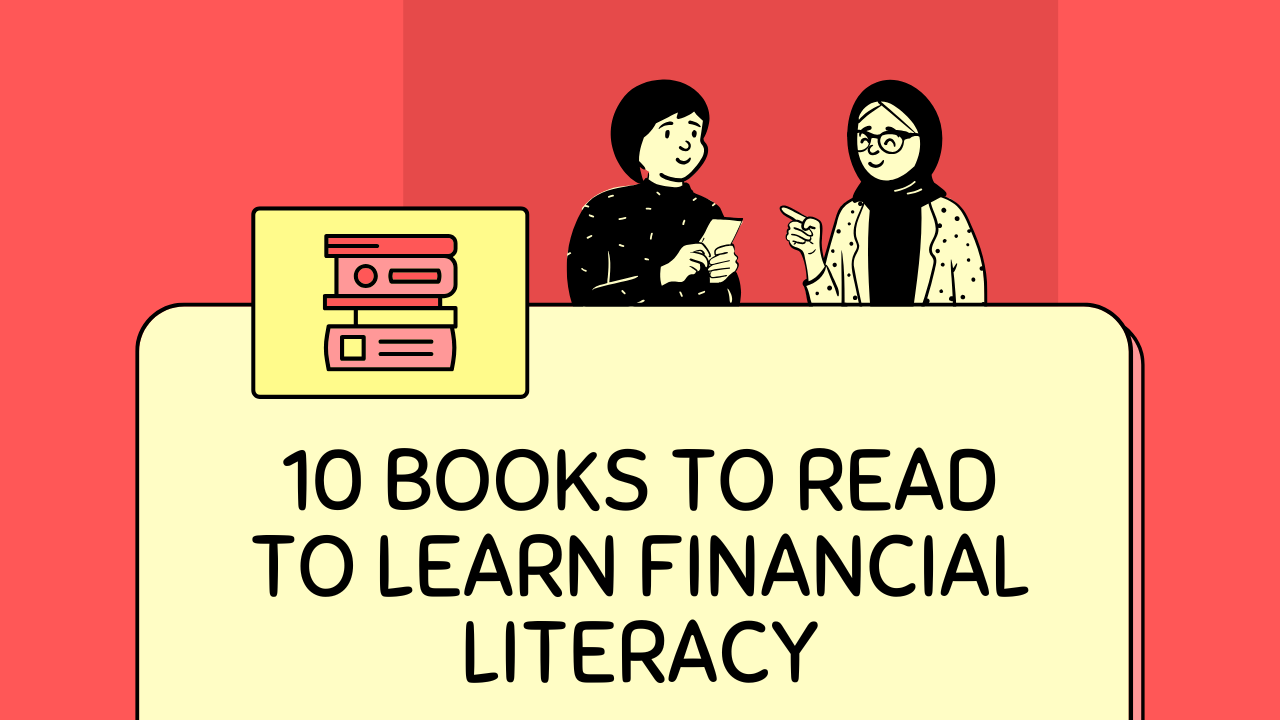Financial literacy is one of the most empowering skills anyone can possess. In today’s world, understanding money management, investments, debt, and budgeting isn’t just helpful—it’s essential. Whether you’re just starting your journey with financial education or looking to sharpen your existing knowledge, building financial literacy can have life-changing impacts. In this blog, we’ll cover what financial literacy is, why it’s important, and the top 10 books for financial literacy that can help beginners and seasoned learners alike.
What is Financial Literacy?
Financial literacy refers to the ability to understand and apply various financial skills, including personal budgeting, investing, and managing debt. It involves knowing how to handle financial challenges, make informed decisions about spending, and prepare for long-term goals like retirement. While some people grow up with a foundation in financial education, many find themselves navigating complex financial decisions without the necessary tools or knowledge.
Without a solid grasp of financial literacy, individuals may struggle with managing debt, saving for future expenses, and making sound investment choices. Simply put, financial literacy gives people the power to make informed choices about their money and understand the consequences of these choices.
Key Components of Financial Literacy:
- Budgeting: Managing daily expenses and planning for larger financial goals.
- Saving and Investing: Growing wealth over time through interest, compounding, and investment strategies.
- Debt Management: Understanding credit, loans, and how to manage debt responsibly.
- Financial Planning: Preparing for future expenses like education, buying a house, or retirement.
- Insurance and Protection: Learning about the types of insurance that protect against financial loss.
If you’re just beginning your journey in financial literacy or want to deepen your understanding, the following books on financial literacy and financial education for beginners are a great place to start.
Top 10 Books for Financial Literacy and Financial Education for Beginners
Let’s dive into the best books to expand your financial literacy. Each of these books offers unique insights and valuable lessons on how to handle money, plan for the future, and build wealth.
1. “Rich Dad Poor Dad” by Robert T. Kiyosaki
A classic in the world of financial literacy, “Rich Dad Poor Dad” breaks down the differences in mindset between someone who is financially literate and someone who is not. The book contrasts the author’s two father figures—one who is financially struggling (Poor Dad) and the other, who is wealthy (Rich Dad). Kiyosaki explains concepts like assets and liabilities, the importance of entrepreneurship, and how financial education can create wealth.
- Key Takeaway: Financial literacy involves learning how to make money work for you through investments and financial knowledge.
Get this book on amazon
2. “The Total Money Makeover” by Dave Ramsey
Dave Ramsey’s straightforward, no-nonsense approach to personal finance has made this book a favorite. Ramsey outlines his “baby steps” to financial freedom, from building an emergency fund to paying off debt and eventually investing for the future. Ramsey emphasizes the importance of discipline, budgeting, and avoiding debt.
- Key Takeaway: Budgeting and debt management are essential components of financial literacy and can set the foundation for future financial success.
Get this book on amazon
3. “The Millionaire Next Door” by Thomas J. Stanley and William D. Danko
In this research-based book, the authors reveal the surprising habits of America’s wealthy and debunk the myth that millionaires all lead flashy, extravagant lifestyles. Instead, they argue that many millionaires are frugal, budget-conscious individuals who make smart financial decisions.
- Key Takeaway: Financial literacy means understanding that wealth often comes from wise spending, saving, and investment choices, not just high income.
Get this book on amazon
4. “Your Money or Your Life” by Vicki Robin and Joe Dominguez
“Your Money or Your Life” goes beyond just financial advice; it encourages readers to examine their relationship with money and assess how their spending aligns with their life values. This book is especially useful for those looking to balance financial literacy with personal happiness and fulfillment.
- Key Takeaway: Financial literacy includes understanding the role of money in personal fulfillment and aligning finances with life goals.
Get this book on amazon
5. “I Will Teach You to Be Rich” by Ramit Sethi
Ramit Sethi’s book is a practical guide filled with actionable steps on automating finances, investing smartly, and building a strong financial foundation without depriving yourself. He covers everything from choosing the right bank accounts to investment strategies, making it a great starting point for financial literacy for beginners.
- Key Takeaway: Financial literacy doesn’t have to be about restrictive budgeting—it’s about setting up a system that works for you and allows you to enjoy life.
Get this book on amazon
6. “The Simple Path to Wealth” by JL Collins
This book breaks down complex investing concepts into simple terms. Collins provides a clear path to financial independence through investing in low-cost index funds and understanding how to make the most of your retirement accounts.
- Key Takeaway: Financial literacy includes understanding investment strategies that grow wealth over time, such as index fund investing and long-term planning.
Get this book on amazon
7. “Financial Freedom” by Grant Sabatier
“Financial Freedom” is a guide to achieving financial independence on your own terms. Sabatier’s journey from nearly broke to financially independent in just five years serves as an inspiration, while he provides insights on side hustles, investing, and budgeting effectively.
- Key Takeaway: Building financial literacy for beginners often starts with learning how to maximize income through side hustles, investments, and disciplined spending.
Get this book on amazon
8. “The Intelligent Investor” by Benjamin Graham
Often hailed as one of the best books on investing, “The Intelligent Investor” is a dense but invaluable resource on value investing. While this book can be complex for beginners, it provides a solid foundation for understanding the stock market and how to make informed investment choices.
- Key Takeaway: Investment literacy is a significant part of financial literacy; understanding market fundamentals can lead to better financial decisions.
Get this book on amazon
9. “Broke Millennial: Stop Scraping By and Get Your Financial Life Together” by Erin Lowry
This book is especially helpful for young adults and beginners. Lowry provides practical advice on navigating financial independence, dealing with student loans, managing credit, and starting investments as a millennial.
- Key Takeaway: Financial literacy for beginners includes mastering basic financial skills, like understanding credit, managing loans, and building good habits from an early age.
Get this book on amazon
10. “Think and Grow Rich” by Napoleon Hill
Although not exclusively a financial literacy book, “Think and Grow Rich” explores the power of mindset in achieving wealth. Hill studied the habits of successful individuals and offers insights on goal-setting, perseverance, and building a success-oriented mentality.
- Key Takeaway: Financial literacy isn’t just about numbers—it also includes the mindset needed to succeed financially.
Get this book on amazon
Why Reading Financial Literacy Books is Important for Financial Education
Books are a powerful tool for building financial literacy. Each of the books on this list offers unique perspectives and practical advice to help readers understand personal finance, investments, budgeting, and more. By reading these books, individuals can equip themselves with the knowledge needed to make informed financial decisions, manage money responsibly, and work toward their long-term goals.
Benefits of Financial Literacy Books:
- Improved Decision-Making: Financial literacy helps you make informed choices about spending, saving, and investing.
- Confidence and Control: Financial education empowers you to take control of your finances rather than feeling overwhelmed.
- Wealth Building: Learning about investments, compound interest, and smart saving strategies contributes to wealth accumulation.
- Avoiding Financial Pitfalls: Understanding debt, budgeting, and expenses can help avoid common financial mistakes.
Final Thoughts on Financial Literacy and Financial Education
Financial literacy is not just about managing money—it’s about creating a foundation for financial security, growth, and independence. Whether you’re a beginner looking to learn the basics or someone with more experience wanting to fine-tune your knowledge, these books provide practical, accessible ways to build financial education.
Each of the top 10 books listed here addresses different aspects of financial literacy and offers valuable insights into budgeting, investing, debt management, and more. As you work toward financial literacy, remember that the journey is ongoing. These resources are a great way to build your understanding and develop the skills needed to make informed financial decisions, helping you work toward a secure and prosperous future.
Please subscribe Easy Budget to stay updated about our latest blogs!











